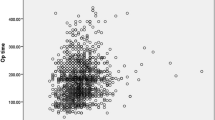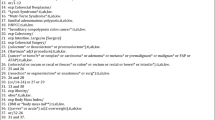Abstract
Background
Obesity is a modern-day phenomenon that is increasing throughout the world. The aim of the present study was to provide data to establish whether the laparoscopic approach to colorectal surgery in the obese patient represents a risk or, rather, a benefit for the patient.
Method
The data presented in this paper were obtained within the framework of a prospective multicenter study initiated by the “Laparoscopic Colorectal Surgery Study Group (LCSSG)” and performed on 5,853 recruited patients. The perioperative course was compared between the three groups: nonobese, obesity grade I, and obesity grade II/III.
Results
Increasing body mass index correlated with a highly significant increase in the duration of the operation (nonobese 167 min, grade I 182 min, grade II/III 191 min; p < 0.001) and in the conversion rate (nonobese 5.5%, obesity grade I 7.9%, obesity grade II/III 13.1%; p < 0.001). The intraoperative complication rate also showed a tendency to increase (nonobese 5.0%, grade I 6.2%, grade II/III 7.1%; p = 0.219). In contrast, no significant differences were found between the groups with regard to the postoperative complication rate (nonobese 20.7%, grade I 21.0%, grade II/III 20.2%), the reoperation rate (nonobese 4.1%, grade I 3.9%, grade II/III 3.6%), and the postoperative mortality rate (nonobese 1.1%, grade I 1.9%, grade II/III 1.8%).
Conclusion
Laparoscopic colorectal surgery is clearly more technically demanding in the obese patient. Apart from this, however, it is not associated with any increased risk of postoperative complications, and thus demonstrates that the pathologically overweight patient can benefit to a particular degree from the laparoscopic modality.
Similar content being viewed by others
References
Kopelman PG. Obesity as a medical problem. Nature 2000;404:635–43.
Delayney CP, Pokala N, Senagore AJ, et al. Is laparoscopic colectomy applicable to patients with body mass index > 30? A case-matched comparative study with open colectomy. Dis Colon Rectum 2005;48:975–81.
Pikarsky AJ, Saida Y, Yamaguchi T, et al. Is obesity a high-risk factor for laparoscopic colorectal surgery? Surg Endosc 2002;16:855–8.
Tuech JJ, Regenet N, Hennekinne S, et al. Laparoscopic colectomy for sigmoid diverticulitis in obese and nonobese patients: a prospective comparative study. Surg Endosc 2001;15:1427–30.
Plocek MD, Geisler DP, Glennon EJ, et al. Laparoscopic colorectal surgery in the complicated patient. Am J Surg 2005;190:891–5.
Tekkis PP, Senagore AJ, Delaney CP. Conversion rates in laparoscopic colorectal surgery: a predictive model with 1253 patients. Surg Endosc 2005;19:47–54.
Dostalik J, Martinek L, Vavra P, et al. Laparoscopic colorectal surgery in obese patients. Obes Surg 2005;15:1328–31.
Raftopoulos I, Courcoulas AP, Blumberg D. Should completely intracorporeal anastomosis be considered in obese patients who undergo laparoscopic colectomy for benign or malignant disease of the colon? Surgery 2006;140:675–83.
Leroy J, Ananian P, Rubino F, et al. The impact of obesity on technical feasibility and postoperative outcomes of laparoscopic left colectomy. Ann Surg 2005;241:69–76.
Senagore AJ, Delaney CP, Madboulay K, et al. Laparoscopic colectomy in obese and nonobese patients. J Gastrointest Surg 2003;7:558–61.
Benoist S, Panis Y, Alves A, Valleur P. Impact of obesity on surgical outcomes after colorectal resection. Am J Surg 2000;179:275–81.
Schwandner O, Farke S, Schiedeck THK, Bruch HP. Laparoscopic colorectal surgery in obese and nonobese patients—do differences in body mass indices lead to different outcomes? Surg Endosc 2004;18:1452–56.
Tsukada K, Miyazaki T, Kato H, et al. Body fat accumulation and postoperative complications after abdominal surgery. Am Surg 2004;70:347–51.
Author information
Authors and Affiliations
Corresponding author
Rights and permissions
About this article
Cite this article
Scheidbach, H., Benedix, F., Hügel, O. et al. Laparoscopic Approach to Colorectal Procedures in the Obese Patient: Risk Factor or Benefit?. OBES SURG 18, 66–70 (2008). https://doi.org/10.1007/s11695-007-9266-0
Received:
Accepted:
Published:
Issue Date:
DOI: https://doi.org/10.1007/s11695-007-9266-0




